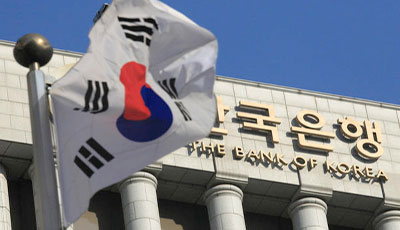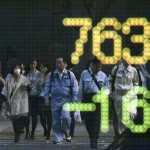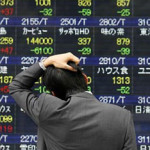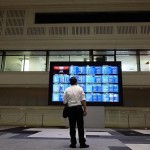Why Korea’s Central Bank Thinks It Won’t Catch Japan’s Deflation

Households surveyed by the Korean central bank expect consumer price gains of 2.6 percent in the next 12 months.
Deflation in South Korea is a looming threat, according to economists at Nomura Holdings Inc. and Samsung Securities Co., who say the Bank of Korea should respond by lowering the benchmark rate.
Comments from BOK officials suggest they disagree. Here’s why.
First, the nation’s relatively high economic growth. Asia’s fourth-largest economy is projected to expand 3.5 percent this year. This compares to estimates of 1 percent growth in Japan and 1.1 percent in the euro area, whose central banks have adopted monetary easing to keep prices rising. BOK Governor Lee Ju Yeol said in December that you “can’t say South Korea is in deflation with growth at a 3% level and inflation at 1%-2% range.”

Another reason cited by the BOK is inflation expectations. Households surveyed by the central bank expect consumer price gains of 2.6 percent in the next 12 months. While that’s a record-low, it’s much higher than the actual increase of 0.8 percent in December. The BOK’s official inflation target is between 2.5 percent and 3.5 percent.

“South Korea’s inflation expectations remain steady and higher than actual price gains,” Park Se Ryoung, the head of the inflation research team at the BOK, said on Jan. 23. “This compares with the decline in the gauge seen in countries like Japan before they experienced deflation.”
The BOK considers the drop in oil prices helpful in preventing deflation, with Governor Lee saying that a 10 percent drop in oil prices boosts gross domestic product by 0.1 percentage point and that South Korea is unlikely to experience deflation in the near future.
Analysts at Nomura and Samsung Securities disagree. They see the decline in oil as adding to deflation risks in South Korea and forecast an interest-rate cut in the next few months.
Nomura economist Kwon Young Sun wrote in a note last week that slower global growth associated with cheaper oil will probably curb South Korea’s exports and add to deflation risks. Samsung Securities economists including Stephen Lee said in a Jan. 19 report that South Korea’s current-account surplus will be 10 percent of GDP this year due to oil’s slump, pushing the won higher and adding to deflationary pressures.
Private think tank LG Economic Research Institute has a slightly different take: while current concerns over deflation seem exaggerated, a rate cut is an option the BOK should consider, as a prolonged period of low inflation would hurt growth the same as deflation would, it said in a Jan. 21 report.
The central bank cut its benchmark rate twice last year to 2 percent, equal to a record-low seen in 2010. The BOK’s 1.9 percent inflation forecast for 2015 is more optimistic than the 1.5 percent median projection by analysts surveyed by Bloomberg.
Source: Bloomberg – Why Korea’s Central Bank Thinks It Won’t Catch Japan’s Deflation





























